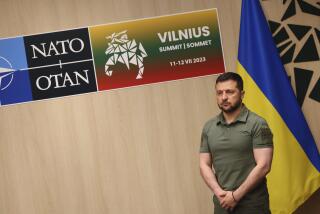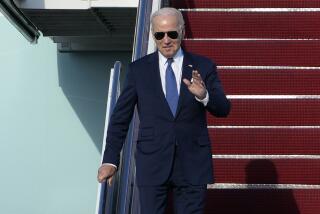Nuclear Free: Better Than NATO
- Share via
One of the few areas where the Democratic and Republican presidential candidates agree is the need for rapid NATO expansion. Although the idea of shifting NATO’s boundaries eastward may have appeal in terms of ethnic electoral politics, it makes for poor foreign policy. Especially onerous and misconceived is the plan to extend NATO’s nuclear umbrella to cover new members.
From Russia’s perspective, the prospect of NATO nuclear weapons being deployed in Poland and other Central European states formerly part of the Soviet bloc is extraordinarily provocative. Almost certainly, it would reinforce Russia’s growing reliance on nuclear weapons and would prompt the redeployment of Russian tactical nuclear warheads in Belarus as well as on ships at sea and on tactical aircraft. Under such circumstances, Poland, far from enhancing its security by joining NATO, could find itself exposed to a more direct and immediate nuclear threat. The dispersal of tactical nuclear warheads by Russia also would have the unfortunate proliferation effect of degrading command and control over those weapons most vulnerable to unauthorized use, theft and accident.
The fatal flaw in the logic of NATO expansion is that it equates formal military guarantees with enhanced security for the states of Central and Eastern Europe. In fact, the best guarantee of the independence and territorial integrity of the fledgling new democracies in the East is economic integration with the West. With this in mind, Western Europe should speedily integrate them into the European Union as has been done with Austria, Sweden and Finland, none of which has any intention of joining NATO.
If an expansion of NATO cannot be avoided, it is crucial to mitigate its negative consequences. One promising approach that has attracted little attention is the creation of a nuclear weapon-free zone in Central and Eastern Europe.
Such a zone was proposed by Belarus at the United Nations General Assembly in 1990 and reiterated at last year’s Nuclear NonProliferation Treaty review conference. The zone would include Poland, the Czech Republic, the Slovak Republic, Hungary and the Baltic states, as well as Belarus, Ukraine, and possibly Moldova. It also might encompass the Balkans and non-NATO Scandinavia. Creation of the zone would not alleviate Russian concerns about the eastward deployment of NATO’s smart conventional weapons. It would, however, be an important new confidence-building measure and a boost for stability in the least stable region of Europe.
Although neither Russia nor the NATO states were supportive of Belarus’ nuclear weapon-free zone proposal, Moscow recently has claimed Minsk’s initiative as its own. Undoubtedly, it has come to see the virtue of delinking NATO expansion, which may be inevitable, from the deployment of nuclear weapons on the territories of prospective new NATO members.
It is doubtful, moreover, that Poland or the other Central European states really want to see nuclear weapons deployed on their territory. Rather, they are inclined to say whatever they think NATO statesmen would like to hear about their readiness to accept NATO deployments. Although their reaction to the 1995 Belarus proposal was dismissive, they have been more circumspect in responding to the recent Russian initiative. In fact, the countries of Central Europe probably recognize that the creation of a nuclear weapon-free zone might help them to achieve their NATO aim without provoking an international crisis or exposing themselves to nuclear risk. In the case of all other zones of this kind, the nuclear weapon states have formally pledged or are expected to pledge that they will neither use nor threaten to use nuclear weapons against any zonal state.
There are those proponents of NATO expansion who believe that because Russia should have nothing to fear from NATO enlargement, the West should ignore all protestations on the subject from Moscow. This perspective misses the point. NATO expansion is the one issue about which all Russian political factions agree. It is seen as suspect, threatening and provocative.
The proposal to create a nuclear weapon-free zone in Central Europe is a positive response to new conditions that merits careful Western consideration. It has the potential to enhance regional stability and to further the post-Cold War security interests of both the NATO states and Russia.
More to Read
Sign up for Essential California
The most important California stories and recommendations in your inbox every morning.
You may occasionally receive promotional content from the Los Angeles Times.










